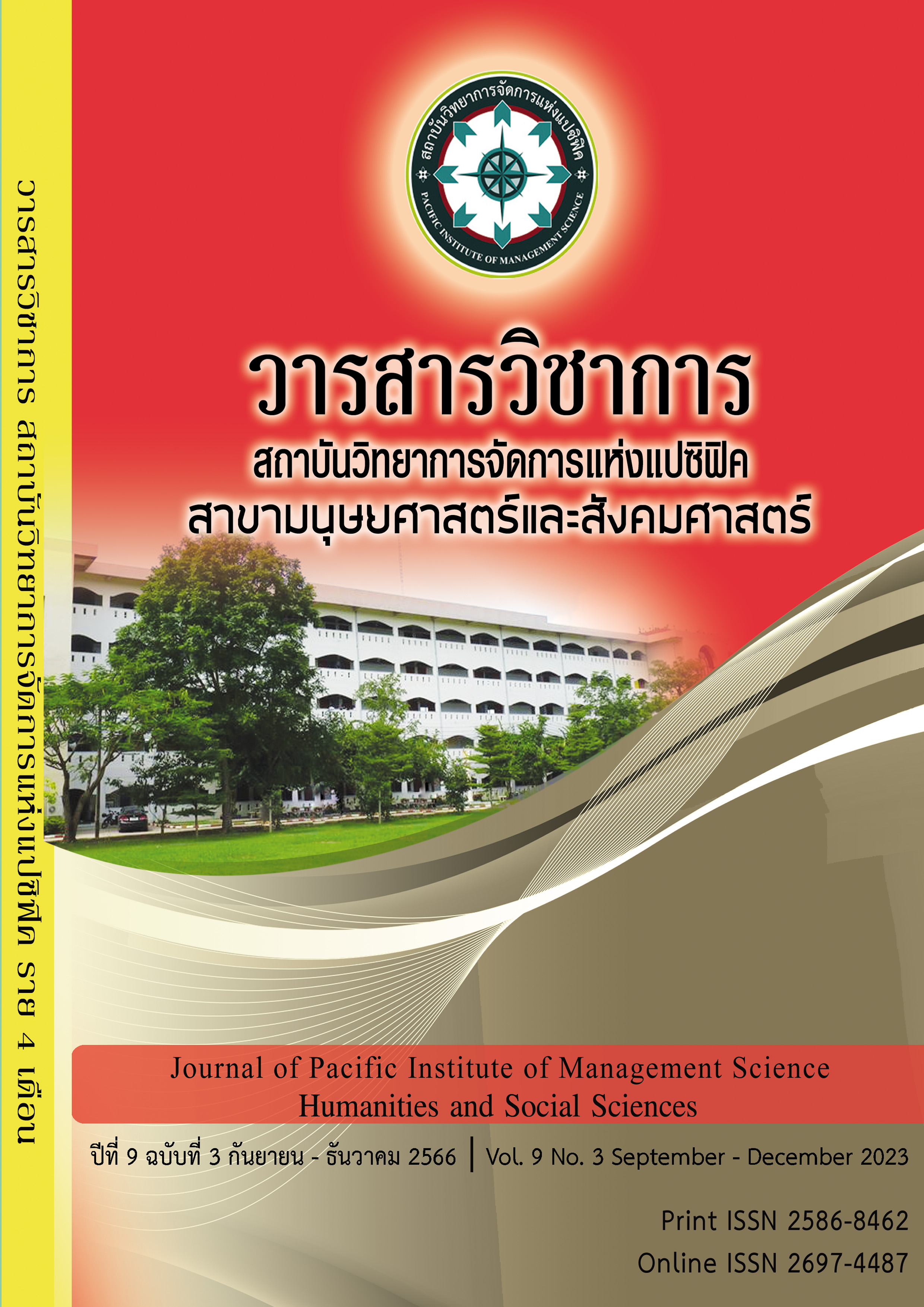Cultural Competence Organizational Engagement and Happiness in Work of a Private University Personnel
Abstract
The purposes of this study were 1) to study the level of cultural competence, organizational engagement and happiness in work of a private university personnel 2) study to compare happiness in work of by personal factor. 3) to study correlation between cultural competence and happiness in work of a private university personnel and 4) to study correlation between organizational engagement and happiness in work of a private university personnel.
The samples of this study were 114 of a private university personnel. Which were selected by proportional stratified sampling. Data were collected and analyzed by computer package program. Statistical procedures were percentage, mean, standard deviation, t-test, F-test (One Way Anova), multiple comparisons; Least Significant Different Test (LSD) and Pearson’s Product Moment Correlation Coefficient.
The results showed that: 1) the level of cultural competence and organizational engagement and happiness in work were at high 2) personnel in a private university who had difference marital status had difference in happiness in work which were statistically significant at .05 3) cultural competence had positive correlation with happiness in work significantly at .01 4) organizational engagement had positive correlation with happiness in work significantly at .01
References
เกษม ตันติผลาชีวะ (2546). อยู่อย่างมีความสุข. ใน เกษม ตันติผลาชีวะ บรรณาธิการ กรุงเทพมหานคร: บุ๊คแบงก์. 239 หน้า ISBN : 974-724-878-6
รวมศิริ เมนะโพธิ (2550). เครื่องมือวัดการทำงานอย่างมีความสุข กรณีศึกษา นักศึกษาภาคพิเศษ ระดับปริญญาโท สถาบันบัณฑิตพัฒนบริหารศาสตร์. คณะพัฒนาทรัพยากรมนุษย์ สถาบันบัณฑิตพัฒนบริหารศาสตร์
ชาญวิทย์ วสันต์ธนารัตน์. (2553). Change… เพื่อสร้างความสุขในองค์กร. สืบค้นเมื่อวันที่ 10 ตุลาคม 2560, จาก http://www.wiseknow.com/blog/2009/05/22/2534/ #axzz1XM0jYg4j
บุศยรินทร์ อารยะธนิตกุล (2557). แนวคิดการจัดการเรียนการสอนเพื่อส่งเสริมสมรรถนะทางวัฒนธรรมของนักศึกษาพยาบาล หน้า 49-57 วารสารพยาบาลทหารบก ปีที่ 15 ฉบับที่ 3 (กันยายน – ธันวาคม 2557)
อังคณา จิรโรจน์ (2558). การศึกษาสมรรถนะทางวัฒนธรรมของอาจารย์และนักศึกษาคณะพยาบาลศาสตร์ มหาวิทยาลัยธรรมศาสตร์ หน้า 1006-1022 วารสารวิทยาศาสตร์และเทคโนโลยี ปีที่ 23 ฉบับที่ 6 (ฉบับพิเศษ)
จินตนา อาจสันเที๊ยะ และสายสมร เฉลยกิตติ (2559). การพยาบาลข้ามวัฒนธรรมกับการเข้าสู่ประชาคมอาเซียน หน้า 10-16 วารสารพยาบาลทหารบก ปีที่ 17 ฉบับที่ 1 (มกราคม – เมษายน 2559)
เยาวดี สุวรรณนาคะ, บุญสืบ โสโสม และกนกอร ชาวเวียง (2559). รูปแบบการพัฒนาเพื่อเพิ่มสมรรถนะทางวัฒนธรรมสำหรับอาจารย์ และนักศึกษาหลักสูตรพยาบาลศาสตรมหาบัณฑิต หน้า 162-171 วารสารการพยาบาลและการดูแลสุขภาพ ปีที่ 34 ฉบับที่ 4 (ตุลาคม – ธันวาคม 2559)
อาภรณ์ ไทยรัตน์ (2559). ความสุขในการทำงานของพี่เลี้ยงสถานสงเคราะห์บ้านเด็กอ่อนปากเกร็ด จังหวัดนนทบุรี สาขาวิชาการบริหารและพัฒนาสังคม คณะสังคมศาสตร์ หาวิทยาลัย เกษตรศาสตร์
จุฑามาศ เอี่ยมวุฒิวัฒนา และศิริพันธุ์ ศิริพันธุ์ (2560). สมรรถนะทางวัฒนธรรมของพยาบาลวิชาชีพแผนกสูติกรรมในโรงพยาบาลนราธิวาสราชนครินทร์ หน้า 14-28 วารสารเครือข่ายวิทยาลัยพยาบาลและการสาธารณสุขภาคใต้ ปีที่ 4 ฉบับที่ 3 (กันยายน – ธันวาคม 2560)
ชวนชม ชินะตังกูร, ศิริชัย ชินะตังกูร และสมใจ เดชบำรุง (2560). ความสุขในการทำงานของบุคลากรการศึกษา สังกัดสถานศึกษาขั้นพื้นฐาน วารสารศิลปากรศึกษาศาสตร์วิจัย หน้า 26-39 ปีที่ 9 ฉบับที่ 2 (กรกฎาคม-ธันวาคม 2560)
สุรเกียรติ ธาดาวัฒนาวิทย์ (2560). สมรรถนะทางวัฒนธรรมของบุคลากรในอุตสาหกรรมบริการ หน้า 1-16 วารสารวิทยาลัยดุสิตธานี ปีที่ 11 ฉบับที่ 2 (พฤษภาคม – สิงหาคม 2560)
ศักดิ์ชัย จันทะแสง (2565). โมเดลสัมพันธ์เชิงสาเหตุของคุณภาพชีวิตการทำงานและความผูกพันต่อองค์กรที่ส่งผลต่อการคงอยู่ของบุคลากรสายสนับสนุนวิชาการ มหาวิทยาลัยเทคโนโลยีราชมงคลกรุงเทพ วารสารวิจัยและนวัตกรรม สถาบันอาชีวศึกษากรุงเทพมหานคร หน้า 57-70 ปีที่ 5 ฉบับที่ 1 (มกราคม-มิถุนายน 2565)
Sheldon, M.E. (1971). Investment and Involvement as Mechanism Predicting Commitment to the Organizational. Administrative Science Quarterly. 143.
Steers Richard M. (1977). Antecedents and Outcome of Organizational Commitment. Administrative Science quarterly. 22 January
Zakaria, N. (2000). The effects of cross-cultural training on the acculturation process of the global workforce. International Journal of Manpower, 21(6), 492-511.
McDonald, D. P., McGuire, G., Johnston, J., Selmeski, B., & Abbe, A. (2008). Developing and managing cross-cultural competence within the Department of Defense: Recommendations for learning and assessment. Paper submitted to Defense Language Office, Arlington, VA.
Mehta, M., Kurbetti, A., & Dhankhar, R. (2014). Review paper–study on employee retention and commitment. International journal of advance research in computer science and management studies, 2(2), 154-164
Imna, M., & Hassan, Z. (2015). Influence of human resource management practices on employee retention in Maldives retail industry. International Journal of Accounting, Business and Management, 1(1), 1-28.
Downloads
Published
Issue
Section
License
Copyright (c) 2023 Pacific Institute of Management Science

This work is licensed under a Creative Commons Attribution-NonCommercial-NoDerivatives 4.0 International License.
บทความที่ได้รับการตีพิมพ์เป็นลิขสิทธิ์ของ สถาบันวิทยาการจัดการแห่งแปซิฟิค
ข้อความที่ปรากฏในบทความแต่ละเรื่องในวารสารวิชาการเล่มนี้เป็นความคิดเห็นส่วนตัวของผู้เขียนแต่ละท่านไม่เกี่ยวข้องกับสถาบันวิทยาการจัดการแห่งแปซิฟิค และคณาจารย์ท่านอื่นๆในสถาบันฯ แต่อย่างใด ความรับผิดชอบองค์ประกอบทั้งหมดของบทความแต่ละเรื่องเป็นของผู้เขียนแต่ละท่าน หากมีความผิดพลาดใดๆ ผู้เขียนแต่ละท่านจะรับผิดชอบบทความของตนเองแต่ผู้เดียว







